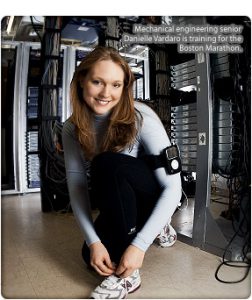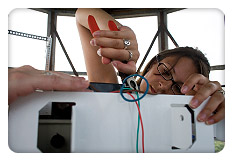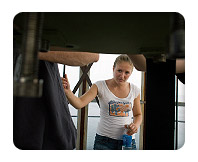Piercings, Not Pocket Protectors
BY MARGARET LOFTUS
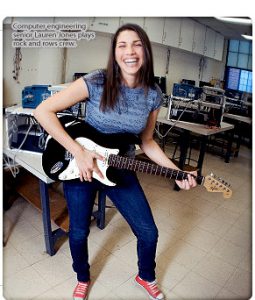
The truth is, you’d be hard-pressed to find one of those goofy archetypes around the halls of Tufts’ School of Engineering. And that’s exactly the point Panetta—decked out this winter morning in a pink polo shirt, black leggings and furry boots—is trying to drive home in an effort to recruit more females to the field. Her secret weapon: “The Nerd Girls,” a group of women engineering undergrads she formed to help dispel the myth that engineers are single-minded, antisocial types who favor pocket protectors and spend their days crunching numbers. And Tufts is a great place to start debunking that stereotype: Though its engineering program is small, it tends to attract slightly more females than many engineering schools. Between 2001 and 2005, women earned nearly 30 percent of the school’s engineering bachelor degrees, compared with an average of 20 percent nationwide. “We get a student who has other interests besides engineering,” says Tufts’ School of Engineering Dean Linda Abriola. “I think that’s attractive to females in general.”
For these young Tufts undergrads, the boorish stereotype couldn’t lie further off the mark. Drawn from various engineering disciplines, the Nerd Girls collaborate on renewable energy and community service projects, such as bringing solar and wave power to a lighthouse on Thacher Island off Rockport, Mass., building a solar-powered race car and developing ways to improve the performance of monkeys trained to assist the disabled with everyday tasks. Their intensive teamwork, weekly outreach presentations and regular interaction with industry professionals have honed their communication skills and fostered confidence uncommon in 21-year-olds—a promising formula in a field where women earn a fraction of the degrees.
If you think being an engineer is sitting around being boring, you’re dead wrong.
This morning, techno music blares as a group of bleary-eyed 8th graders from Rockport Middle School files into a classroom where Panetta introduces herself. “Do I look like an engineer?” she asks them. “Do I look like a professor? Do I look cool?” After a few half-hearted responses—these are 13-year-olds after all—Panetta explains that the music was written by a Nerd Guy (there are a few) who wants to be a sound engineer. Engineers can do cool things like that, she says, adding: “If you think being an engineer is sitting around being boring, you’re dead wrong.” And this is where the Nerd Girls come in. Mechanical engineering senior Danielle Vardaro introduces herself, telling the kids that she plays basketball, is training for the Boston Marathon and has already accepted a job with Boeing. Electrical and biomedical engineering senior Sumi Nadkarni says she’s learning Japanese, her fifth language. And computer engineering senior Lauren Jones, who sports a pierced lip, (“body piercing and tattoos are OK,” shouts Panetta) explains that in addition to helping design the solar car’s electrical system, she’s on the Tufts crew team and plays the guitar.
Jill-of-All-Trades
Panetta credits Renaissance women such as these for her inspiration to start Nerd Girls eight years ago. “The whole idea came when I had these well-rounded girls in my class,” she explains. What began as her personal campaign to debunk the stereotype of engineers evolved into a mission to immerse students as young as freshmen in hands-on projects and interactions with industry professionals. “Everybody is realizing that research and industrial experience early on retains students in general,” she says. Indeed, in her early career as a computer engineer for Digital Corp., Panetta saw the fallout from engineering programs that did little to expose their students to real-world applications, especially team-based projects common in industry. “There was a huge attrition rate. I realized you have to learn to be a team player or you’re dead.”
Most Nerd Girls participants are juniors and seniors who receive credit for the program as an independent study or senior capstone project. Panetta says the group sustains itself, relying on junkyards for parts and funds from corporate sponsors. “I’ve taught them that hearing ‘no’ is better than not even trying, so they’re not afraid,” she explains. And since Panetta purposely chooses projects that she doesn’t know much about, the students get minimal guidance. Instead, she invites industry professionals to evaluate their work.
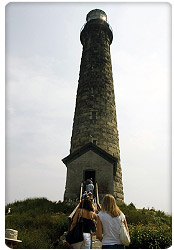
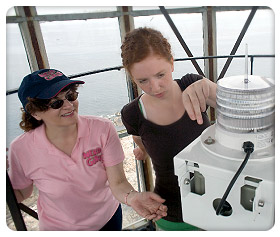
Many of the Nerd Girls say the experience has helped shape their future. Stephanie Meyer, a senior in computer engineering who is working on the car’s electrical system, says the project has made her “feel much more equipped” for the real world after graduation. Vardaro, who had always planned on a career in investment banking, turned down a job offer from Goldman Sachs after realizing how much she enjoyed working with materials. “Nerd Girls helped, because I saw the technical piece paying off and I thought, ‘I like this,’” says Vardaro, who will work as a materials review board engineer at Boeing. Rucker says her Nerd Girls work has been a real bonus in her job search. “It’s saved me in interviews so many times.” She’s turned down job offers from Ford and GM and is considering going to grad school for biomedical engineering.
Engineering Dean Abriola notes that female students at Tufts get better grades than their male counterparts and that there is no attrition rate among engineering students. Mechanical engineering senior Cristina Sanchez, who works with Valdaro and Rucker on the Nerd Girls mechanical team, credits the school’s low student-to-faculty ratio for the retention rate. “It helps you build confidence, which means you’re less likely to drop out.”
Not surprisingly, the success of Nerd Girls has caught the attention of the local and national press, and now, Hollywood. Independent producer Karen Johnson, who specializes in film projects focused on women, has teamed up with Panetta for a Nerd Girls reality TV series. While the details have yet to be finalized, filming is set to begin this summer. The concept will likely be based on the Thacher Island model, where Nerd Girls invited from schools around the country will work together to design and implement a large-scale renewable energy project. The show will track their progress and their lives as it unfolds.
Johnson said she wanted to expand on the idea of creating role models for girls after she produced a documentary about Hollywood stunt women. “If you have something that you put in the position of public viewing and you make it look desirable, like these girls who are smart, cute and very capable, immediately you want to be them.” She’s betting that ’tween and teen girls will tune in: “Girls are interested in the stereotypical things like beauty and glamour, but there are a lot of studies that show women are interested in problem-solving.”
Panetta has high hopes that the show will be just the sort of media exposure needed to get more kids interested in becoming engineers. “It’s going to change the way our nation’s youth thinks about engineering,” she says. Until then, the Nerd Girls will savor putting that pocket-protector image to rest one person at a time. Says senior Jillian Warner: “I love the surprise in people’s eyes when I tell them I’m a computer engineer.”
Margaret Loftus is a freelance writer based in Charleston, S.C.
Category: Features
